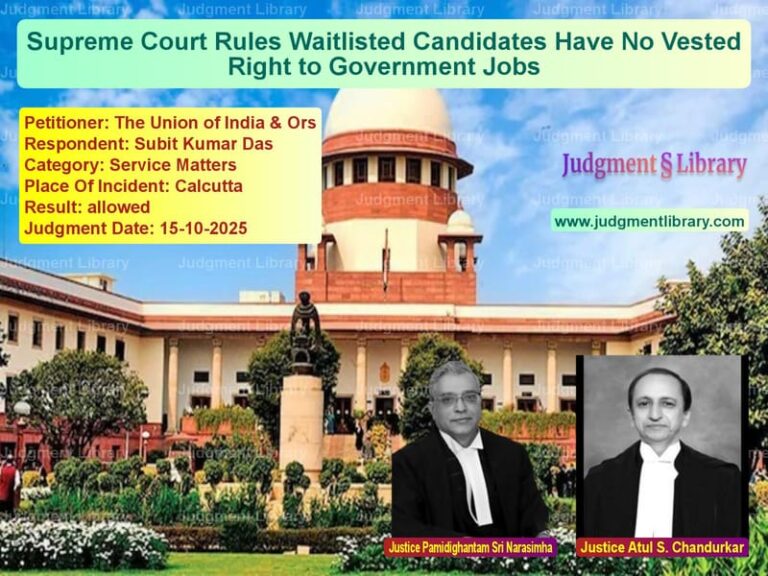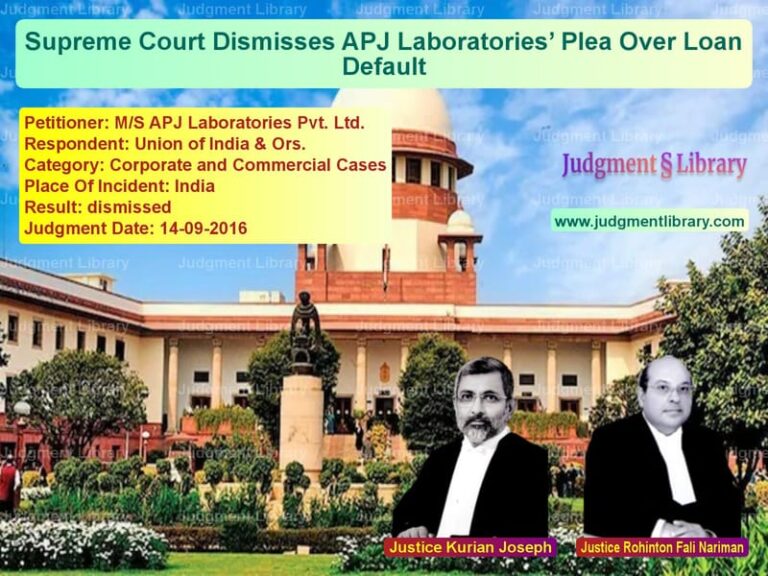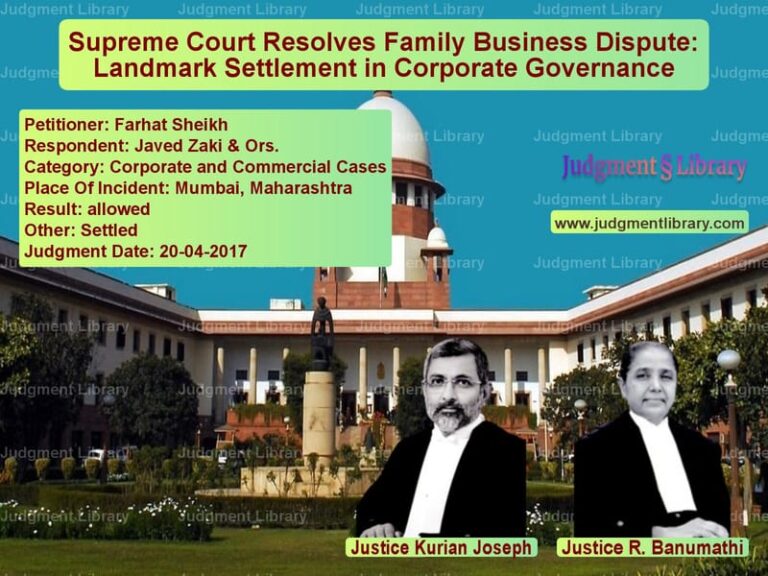Supreme Court Remands UCO Bank’s Financial Dispute Case for Fresh Adjudication
The case of United Commercial Bank & Another vs. Gangadhar Mohanty & Another is a significant Supreme Court ruling delivered on November 18, 2016. This judgment revolves around a financial dispute concerning a compromise settlement in a banking transaction. The Supreme Court emphasized the importance of judicial fairness in financial matters and remanded the case back to the High Court for reconsideration.
Background of the Case
The dispute arose when the United Commercial Bank (UCO Bank) challenged an order passed by the High Court on July 17, 2014. The High Court had directed the Zonal Manager of UCO Bank to submit an affidavit affirming that no compromise settlements had been executed in cases where the property value exceeded the outstanding loan amount.
The bank, feeling aggrieved by this directive, approached the Supreme Court, arguing that such an order was beyond judicial review and interfered with the bank’s discretion in financial settlements. The case was heard in conjunction with other financial disputes regarding procedural fairness in banking transactions.
Key Legal Issues Considered
- Was the High Court correct in directing the Zonal Manager to file an affidavit?
- Did the High Court exceed its jurisdiction in questioning the bank’s financial decisions?
- Was the matter suitable for reconsideration by the High Court?
- What is the judicial approach in reviewing compromise settlements in banking disputes?
Arguments Presented
Appellants’ (United Commercial Bank) Arguments:
- The High Court’s directive to file an affidavit was excessive and amounted to judicial overreach.
- Banking transactions, particularly compromise settlements, are governed by financial regulations and do not require judicial intervention.
- The bank has the discretion to enter into settlements based on commercial prudence, and courts should not impose procedural mandates unless there is evidence of wrongdoing.
Respondents’ (Gangadhar Mohanty & Another) Arguments:
- The bank should be held accountable for compromise settlements and should ensure transparency.
- The directive to file an affidavit was necessary to confirm that there were no discriminatory practices in settlements.
- The High Court acted within its powers to seek an explanation from the bank regarding financial decisions affecting the public interest.
Supreme Court’s Observations
The Supreme Court reviewed the High Court’s directive and ruled that while courts can ensure procedural fairness in financial matters, they should not interfere with the commercial discretion of financial institutions without concrete evidence of misconduct.
The Court noted:
“The High Court should reconsider the matter without insisting on an affidavit from the Zonal Manager, as the requirement of such an affidavit goes beyond the permissible scope of judicial intervention in banking transactions.”
The Supreme Court emphasized the following key principles:
- Courts must be cautious while intervening in banking matters and should respect financial autonomy.
- While financial institutions must be transparent, procedural mandates should not be arbitrarily imposed by courts.
- The High Court’s order requiring an affidavit was excessive and needed reconsideration.
- Judicial scrutiny in financial cases must be balanced to ensure both accountability and financial stability.
Final Judgment
The Supreme Court ruled:
- The High Court’s directive requiring the Zonal Manager’s affidavit was set aside.
- The case was remanded back to the High Court for fresh consideration.
- The High Court was instructed to resolve the matter by March 31, 2017, ensuring expeditious disposal.
- The appeal by UCO Bank was allowed, but the substantive issues remained open for fresh adjudication.
- No costs were imposed on either party.
Impact of the Judgment
The ruling has significant implications:
- It reinforces that judicial intervention in banking matters must be limited to procedural fairness.
- It clarifies that courts should not impose unnecessary procedural requirements such as affidavits in financial disputes.
- It ensures that banking compromises remain subject to legal scrutiny but only under specific legal grounds.
- It sets a precedent that High Courts should not interfere in banking decisions without a strong legal basis.
Conclusion
The Supreme Court’s decision in United Commercial Bank vs. Gangadhar Mohanty establishes a vital precedent for judicial oversight in financial matters. By remanding the case back to the High Court for fresh adjudication, the judgment ensures that judicial scrutiny does not hinder commercial decision-making. The ruling reinforces the balance between judicial oversight and financial discretion, ensuring fairness in banking transactions while upholding the independence of financial institutions.
Don’t miss out on the full details! Download the complete judgment in PDF format below and gain valuable insights instantly!
Download Judgment: United Commercial Ba vs Gangadhar Mohanty & Supreme Court of India Judgment Dated 18-11-2016.pdf
Direct Downlaod Judgment: Direct downlaod this Judgment
See all petitions in Bankruptcy and Insolvency
See all petitions in Corporate Compliance
See all petitions in Contract Disputes
See all petitions in Judgment by Kurian Joseph
See all petitions in Judgment by Rohinton Fali Nariman
See all petitions in allowed
See all petitions in Remanded
See all petitions in supreme court of India judgments November 2016
See all petitions in 2016 judgments
See all posts in Corporate and Commercial Cases Category
See all allowed petitions in Corporate and Commercial Cases Category
See all Dismissed petitions in Corporate and Commercial Cases Category
See all partially allowed petitions in Corporate and Commercial Cases Category







